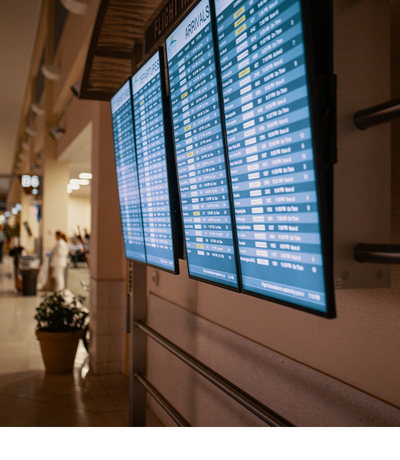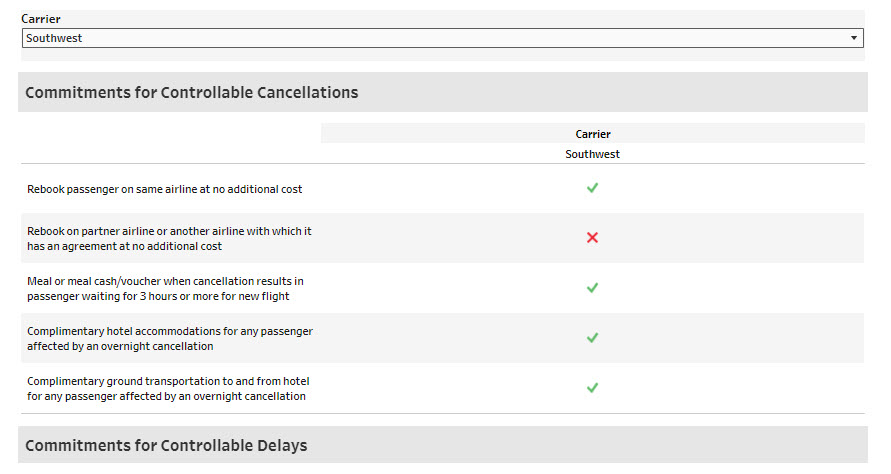Can a new airline service dashboard help you plan your next trip?
16 September 2022
Summer is over and what a hectic season it was for travelers.
As summer travel levels returned to nearly pre-pandemic levels, nearly one quarter of all flights by US airlines were delayed according to FlightAware. The average delay was about an hour.
Every entity across the travel system, from airlines to airports to transportation, was affected as travel demand returned from historic pandemic lows. As complaints poured in, the US Department of Transportation (US DOT) publicly challenged the major carriers to improve customer service. They called for transparency regarding the accommodations each airline provides for delays and cancellations. The end result is a new customer service website that’s supposed to help travelers.
Will this new website help you plan your next trip? Let’s take a look.

Introducing the US DOT Airline Customer Service Dashboard
At first glance, the US DOT Airline Customer Service Dashboard is a clean and easy read.
- Green check marks mean the airline has committed to providing that service or amenity.
- Red check marks mean they have not explicitly committed to providing it.
Select the carrier for your next flight from the drop-down at the top and you can see the specifics by airline. Here’s what we see for support with cancellations when Southwest Airlines is selected:

Key point: The dashboard does help travelers understand the amenities a US airline has to provide should there be a controllable flight cancellation or delay.
Of course, the ‘devil is in the details’ as they say, so we dug a little deeper.
What’s a “controllable cancellation or delay?”
What constitutes a controllable flight cancellation or delay is defined on the customer service website:

Airlines are required to adhere to their commitment to care for customers in the event of controllable delays or cancellations.
Guess what’s not controllable? You guessed right – the weather.
How many times have you been told the delay is due to the weather? If I think back, it’s nearly all of them.
Even if the weather looks perfect where you are and your parents say the weather is perfect where you’re flying, weather has wide-reaching effects on the airline system. It can be a factor in connecting airports or even where the plane you’re assigned to fly on is flying from.
Key point: Weather is not considered a “controllable” factor in airline customer service policies.
What is “reasonable compensation?”
Scrolling below the tables on the DOT airline dashboard, there’s a list of links to the customer service plans for each of the 10 carriers. You can look up what each airline considers reasonable compensation, and each is different.
The key question in our minds remains, however. What is ‘reasonable compensation’? American Airlines doesn’t acknowledge a specific amount, but United does (up to $200).
Key point: assuming a nearby hotel room is available, don’t expect something full-service. You’re more likely to get an amenity-free budget room where the airline has pre-negotiated a rate.
What is considered a “significant delay?”
At this writing, when a traveler experiences a canceled or significantly delayed flight caused by the airline, this is the compensation you can expect:

We couldn’t immediately find American Airlines’ definition of ‘significant delay’ and we also noticed that they include information about ‘lengthy onboard delays on the ground’ called ‘extraordinary delays’, which is slightly concerning.
Key point: the US DOT does not specifically define what a significant delay is, it’s up to each airline to define it for themselves.
Final word
Will the new US DOT airline service dashboard help you with your next flight?
Perhaps.
It’s helpful because:
- it organizes each airline’s commitment into a single place, and
- it provides links to the airline’s service plans.
So, I recommend it as a useful tool when you’re researching your options prior to a trip. Or when you’re in a bind and need to show the airline representative what you know.
Your right to a refund
The commitments to customer service regarding controllable delays or cancellations do not affect a traveler’s right to a refund. If an airline cancels or makes a significant change to a flight regardless of the reason, travelers have the right to a refund if they choose not to accept the airline’s alternative offer.
If you’re curious, you can learn more about your right to a refund from the airline. We covered the topic of refunds for flight delays recently in How to get compensated for flight delays.
Related topics
Damian Tysdal is the founder of CoverTrip, and is a licensed agent for travel insurance (MA 1883287). He believes travel insurance should be easier to understand, and started the first travel insurance blog in 2006.
